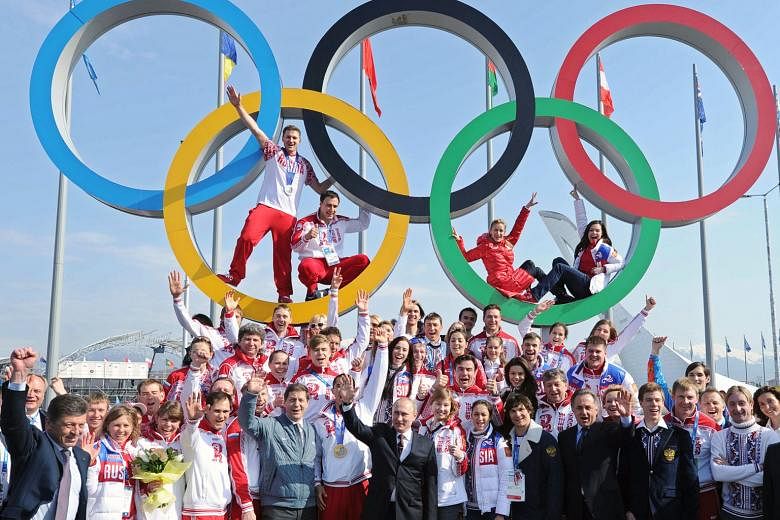MOSCOW • The Kremlin yesterday cautioned against an emotional response after Russia was banned from next year's Winter Olympics, sparking outrage in the country.
Russia was banned on Tuesday from the Pyeongchang Games by the International Olympic Committee (IOC) over its state-orchestrated doping programme - something it has always denied - but clean Russian athletes will be allowed to compete under an Olympic flag.
"The situation is serious, it calls for deep analysis and it would be wrong to give in to emotion here," said Russian President Vladimir Putin's spokesman Dmitry Peskov.
Mr Putin later gave his views on the IOC's decision, saying it was "politically motivated" and "baseless".
"This all looks like an absolutely staged and politically motivated decision. We all see this, for me there is no doubt about it," he said.
But he added that he would not prevent national athletes from competing at the Pyeongchang Games under the Olympic flag.
-
Key IOC findings
-
• Russian authorities developed a system that allowed a Moscow laboratory to routinely change positive test results to negative, as well as to tamper with samples during the Sochi Games in 2014.
•Thirty-four Russian athletes tested positive in re-analysis of samples from the 2008 and 2012 Olympics, confirming "a widespread culture of doping in Russia, affecting numerous sports for a long period of time".
•Some individuals received payments to conceal positive doping tests, having previously encouraged athletes to purchase doping substances.
•The system progressed with anti-doping technologies. It began with deceit on the reporting system, escalated with the creation of false biological profiles and ended with the tampering of samples.
REUTERS
"We will certainly not declare any boycott, we will not prevent our Olympians from competing if they want to take part in a personal capacity," he said.
The IOC had the option of hitting Russia with a blanket ban, which was applied to apartheid-era South Africa from 1964 to 1988. But its decision to choose a more moderate path offers some Russian athletes a route to the Games - albeit by invitation only and dependent on a stringent testing programme.
Those who do go to the Games will participate under the name "Olympic Athlete from Russia", while the Olympic anthem would be played in any award ceremony.
The sanction, following evidence unearthed by the Schmid Commission, was the toughest levelled by the IOC for doping and came just 65 days ahead of the Feb 9-25 Games.
In announcing the decision, IOC president Thomas Bach accused Russia of "perpetrating an unprecedented attack on the integrity of the Olympic Games and sport".
Former Switzerland president Samuel Schmid told a news conference that his report focused on allegations of government involvement in Russian doping at the Sochi Games and confirmed "the systematic manipulation of the anti-doping rules and system".
Russia have since been stripped of 11 of their 33 Sochi medals, losing pole position to Norway. The findings were based not only on the testimony from Russia's former anti-doping chief-turned-whistle-blower Grigory Rodchenkov but also on scientific evidence.
The IOC also banned Russia's Deputy Prime Minister Vitaly Mutko - who was sports minister during the 2014 Games - for life, and suspended the Russian Olympic Committee and its chief Alexander Zhukov.
Most of the indignation came from the presidents of Russian winter sports federations, who slammed the decision.
Alexei Kravtsov, president of the Russian Skating Union, said: "The decision is completely unjustified."
AGENCE FRANCE-PRESSE, REUTERS

